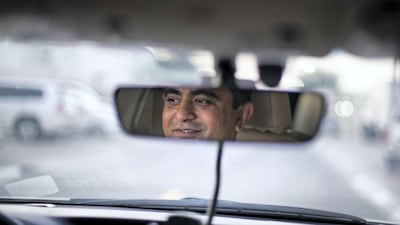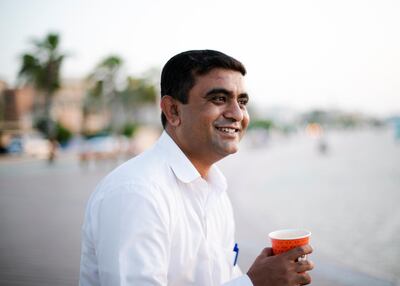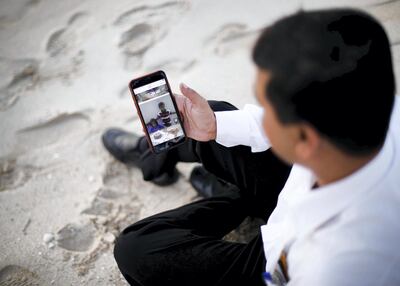Syed Mohammed’s grandfather came to Sharjah from Pakistan in the 1940s as a soldier in the British military. The nights were sticky and hot. In lieu of air conditioning, the soldiers would soak sheets in water and sleep on top of the water tower to catch any hint of a breeze.
“But we were afraid while sleeping,” the grandfather, Noor, would tell his grandson. “If we fell down, what would we do?”
Mr Mohammed, 38, likes to regale tourists with his grandfather’s tales of hardships. He is a third generation resident, a driver for the ride-hailing service Careem and unofficial keeper of his family’s 70 year history in the Gulf.
“As per my grandfather, life was very tough,” said Mr Mohammed. “It was like, all sand, nothing over there.”
His grandfather, Noor, was the first of the family to arrive and was soon followed by two younger brothers who enrolled with the British military.
After the brothers, came his son, Khalid. It was the late 1960s and the Gulf cities of Dubai and Abu Dhabi were growing. The boy left their village in northeast Pakistan, about 20 kilometres from Pakistan-administered Azad Jammu and Kashmir, at age 15, and crossed Pakistan’s interior. When Khalid reached Karachi, he caught a boat bound for Fujairah.
Khalid made his way to Dubai, joined his father and worked as a porter at the spice market on the creek. At age 18, he had the opportunity to join Dubai Police but there was just one problem: his entry was undocumented. It was 1970 and the emirates were only months away from unification. Centuries of casual migration across the seas were at an end. He needed papers.
So, he travelled from Ras Al Khaimah to the Musandam Peninsula, got a boat back to Iran, returned to Pakistan and applied for a passport. A few weeks later, Khalid was on a flight to Dubai, about to make his first documented arrival.
He joined Dubai Police in 1971 and worked his way up the ranks, from cleaner to corporal.
Khalid's wife joined him in the UAE in 1984 with his two sons. One was Mr Mohammed, who was only three years old at the time. They lived in Al Nasr Square, then a place of open spaces with buildings of wood and corrugated iron.
“Beautiful area at that time, beautiful time,” said Mr Mohammed. “There was only one building you know, the main Deira Tower.”
The family grew. Seven children slept in one bedroom, parents in the other.
Cousins, aunts and uncles gathered at the house for Fridays meals. Evenings were spent stargazing with the neighbourhood boys, sprawled out on the sand, snacking on the local crisp brands, Pofak and Chips Oman, drinking laban.
“When we were sitting alone in the sand, we were in heaven. We only wanted that our father and mother would not come by. We would take a bed sheet and sit there like kings.”
His formal education began at age 11, when he was sent back to Pakistan with his older brother for three years of boarding school.
The boys were heartbroken. Homesick, they convinced their mother to let them return to Dubai and enrolled at His Highness Shaikh [sic] Rashid Al-Maktoum Pakistan School Dubai in Al Qusais. Officially, it was an English language school but its halls echoed with chatter in Urdu, Punjabi, Pashto and Balochi.
Holidays to Pakistan held little interest. They were already outsiders.
After decades of various jobs at various companies, desk work took its toll on Mr Mohammed. A doctor warned him to change his lifestyle so he quit his office job and became a driver for tourists, businessmen and Careem customers.
“Some people tell me my profession has taken a u-turn,” said Mr Mohammed. “But I am happy. Independence. You know, it’s the kind of job where I’m free. Whenever I want off, I can take off. I am my manager, I am my labour. Whenever I want to work, I am free to work.”
He shares an old villa in Jumeirah with nine other drivers. His wife and two children, aged eight and 11, are in Pakistan. School fees are high in the Emirates. He hopes they will not live in the UAE when they grow up, lest they be separated from their children as he has been from them.
“I want them to settle down in my home country. Okay, my father enjoyed a good life, he was with his family. I am living the life where my family is there and I am here. I want to live where they live. They shouldn’t be living like me when they are older. They should be living with their wives and their kids.”
Yet for him, life outside the Emirates is unimaginable.
“I don’t care of my life because I owe too many things to this country. Because this is my home. I have such feelings for this place.”


